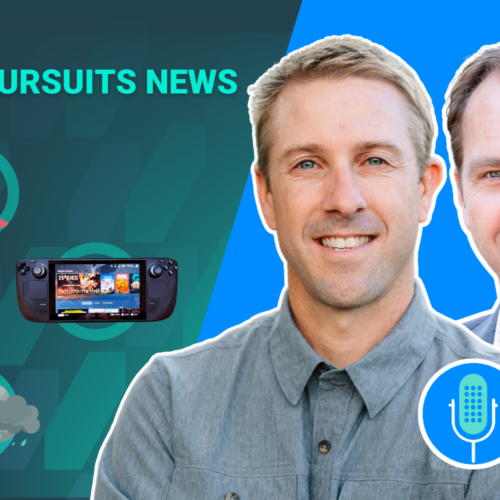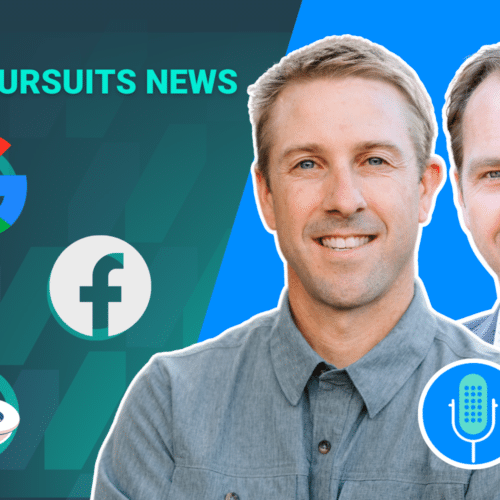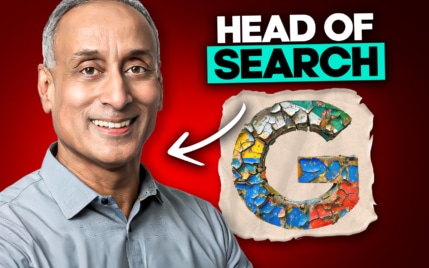Niche Sites + “Long Tail” Kindle Publishing = Over $40k Per Month: Inside Dave Chesson’s Empire
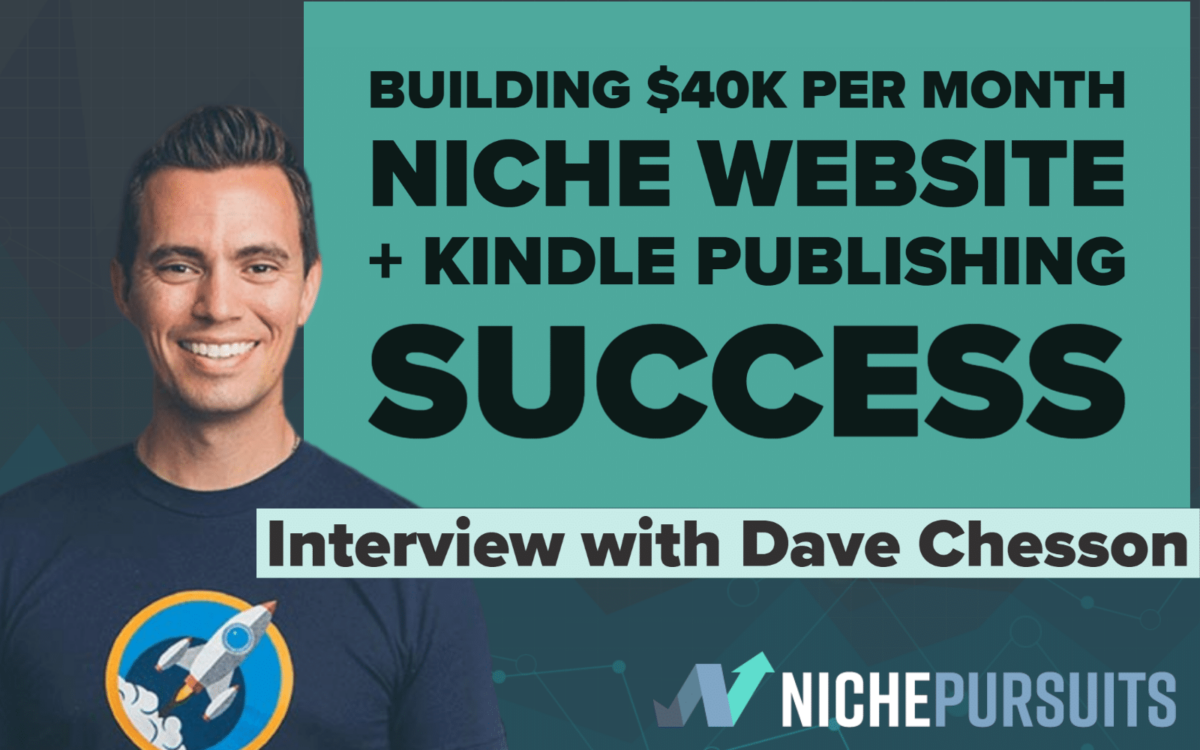
When you buy something through one of the links on our site, we may earn an affiliate commission.
Dave Chesson has self-published nine books on Amazon that now have a combined revenue between $7-9k a month. How does he do this? He describes it as the “Long Tail Pro” of Amazon.
Finding undervalued Amazon keywords that are easy to rank on Amazon for that drive traffic to the book.
Publisher Rocket was started by Dave to build a system that helps you find Amazon keywords, identify competition, and see what other authors are making on their books. So you can find your niche before even writing your book.
Here are a few things Dave has been successful with:
- Building “Calculators” to drive authority traffic.
- Building a $40,000 per month authority site in the gun niche.
- Getting on the Amazon Best Seller list only selling two books a day.
- Identifying keywords and write book descriptions that get traffic.
- Spying on other authors to see just how much they are making.
Watch the Entire Interview
Publisher Rocket + Mastering Kindle Keywords Course
As a heads up, Dave Chesson was kind enough to create a course that shows you exactly how to be successful in publishing “long tail” Kindle books. He created Mastering Kindle Keywords specifically at my request for the Niche Pursuits audience.
However, this course is only available to those that decide to buy Rocket Publisher this week. Rocket Publisher is Dave's software tool that he's created to make finding keywords for Kindle books much easier. The software actually does a full competition analysis and much more.
You can see an entire overview of what Publisher Rocket does below:
If you are interested in taking advantage of the special deal of Rocket Publisher + Mastering Kindle Keywords course, you can get the deal right here.
(Again, this deal expires this week and Rocket Publsiher + Mastering Kindle Keywords is only available through my link. The course will be delivered in a bonus email after purchase).
Get Publisher Rocket + Mastering Kindle KeywordsSelf Publishing Earnings
Dave published a new book back in February but currently has nine books steadily generating 7-9k a month. I interviewed Dave about three years ago, and his growth is consistent.
He credits his continued success in writing these books by focusing on Amazon's existing markets with no other books meeting their needs. In other words, he is selling water in the desert.
I'm always impressed by what Dave is building. Not only is he selling books, but he's building software and creating authority sites.
Complete Access $97 - Never pay again

SELL MORE BOOKS ON AMAZON WITH PUBLISHER ROCKET
- Spy on competitors to see just how much they are making
- Find keywords readers are searching for on Amazon
- See just how many books you need to make Amazon Best Seller Lists
- Discover the best keywords for your self-published book!
- Get Mastering Kindle Keywords Course Free, When you Purchase Publisher Rocket
How Dave created tools and calculators to grow an audience
I've been analyzing niche sites for years, but Dave's audience with Kindlepreneur is one of the most engaged and influential audiences I've ever seen. One strategy that helped increase his traffic, get links, and grow his audience was by creating a calculator that people loved!
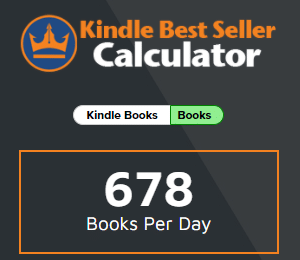
The calculator gave insight as to what the Amazon ranking numbers meant.
I'm sure it was a lot more complicated than Dave makes it sound, but his efforts paid off. People in forums and on Facebook groups, we're talking about it. People were coming back time and time again to use the calculator. The industry as a whole couldn't speak about self-publishing without mentioning the tool.
Building a Niche Site in 2020
This strategy of building tools doesn't just doesn't work for Amazon publishing. Dave partnered with Ryan Kleckner to build a tool to identify the proper scope ring finder. Ryan is an expert as a long-range marksman and together they have built GunUniversity.com.
Not only does the tool provide value to the user by finding the right one, but it sends them to the best price on the internet, and they receive an affiliate commission along the way.
With some luck of timing, having gun sales at an all-time high in 2020, The two are pulling in 250,000 visitors a month and doing just over $40,000 a month.
I'm no gun expert, but this is a textbook example of building a highly successful niche website.
Cost to build a calculator for your site?
The Kindle calculator that he built only cost him $500 to build. The tool didn't directly bring him any revenue, indirectly from web traffic to speaking gigs, an incredible ROI by any measure.
If you listen to the full podcast, Dave talks more about how much he paid for his other tools, including the work that he put in to build the scope finder tool.
How to partner with an expert to build an authority site?
I find a lot of people are always trying to find a partner. This excuse for starting a business is one I hear far too often.
You don't have to look far to find others to partner. Ryan and Dave both lived in Franklin, Tennessee, a modest town of 80,000 people. After stumbling across each others work, they went for lunch, and their unique skill sets were a match, and Gun University began.
Writing books takes time
Writing self-published books, authority sites, or partnering with experts, is an incredibly time-consuming task. In the early days, Dave credited his ability to do this by waking up at four every morning. Getting to his computer at 4:30 am and then working until 7 when he would have to go to work.
Dave's typical day:
4:00 am – Wake UP
4:30 am – Working on niche website or books
7:00 am – Get ready for work
9:00 am – Day Job
5:00 pm – family time. (he made sure to never miss out on anything)
“After the kids go to bed, it was, it was my wife's decision of whether or not I went back to work or if she wanted me to, you know, stay in and watch a movie or do something like that.”
His evening strategy is what I think shows how well Dave has his priorities on his family and in the right areas.
This schedule would allow Dave to put in 21 hours a week. Today things look a tad different.
The Publisher Rocket team now
Today 17 people work for Dave. With the growth, Dave expanded his team and invested in a programming company called Paladin. Learning about programming enabled him to build a few more features for the Publisher Rocket tool, and in true Dave Chesson fashion, a new book will be published soon on the topic of programming as well!
But to scale, Dave had to grow out of the solopreneur mindset, create systems, SOPs (standard operating procedures), and hire people for responsibilities and not tasks.
Hiring a COO was one way he was able to do more work now while doing less work.
It's these types of systems that consistently get Dave on bestseller lists.
System for landing on the bestseller list
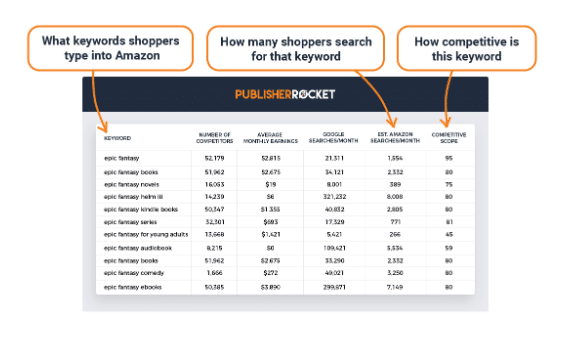
With over 7 million + books in the Amazon catalog, It's not luck, but systems that land him on the Amazon Bestseller lists routinely.
Not all bestsellers are equal but based on how many books are sold for that category. For example, category A may require you to sell two books a day while category b may need 100 book sales a day. Dave did take all 1000+ categories Amazon listed them out to see which book categories are most comfortable to rank. His list is available on Rocket Publisher.
The systems he uses are in the course he created for the Niche Pursuits audience. This is the best place to start if you want to mimic the systems Dave uses personally.
Providing Value in the Amazon Marketplace
One misconception is you have to be a great author to sell books on Amazon. The truth is you need to be able to solve people's problems and provide value to sell books. Much of this comes down to understanding the market.
Publisher Rocket even has a tool that allows you to spy on other Authors to see just how much they are making with their books.
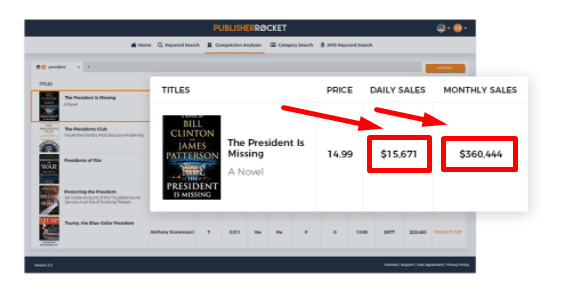
It's no secret the ones making the most have optimized keywords and descriptions.
The good news is it's relatively easy to rank for niche keywords in the Kindle store.
In the podcast, Dave gives the example of books on “Evernote.” While it's going to take a lot of work to rank for the “Evernote” keyword, you can use Publisher Rocket to see what people are searching for.
To start earning quicker with less marketing effort, you could target keywords such as:
- Evernote for teachers
- The best Evernote guide for students
- Evernote for lawyers
You get the idea.
Complete Access $97 - Never pay again

SELL MORE BOOKS ON AMAZON WITH PUBLISHER ROCKET
- Spy on competitors to see just how much they are making
- Find keywords readers are searching for on Amazon
- See just how many books you need to make Amazon Best Seller Lists
- Discover the best keywords for your self-published book!
- Get Mastering Kindle Keywords Course Free, When you Purchase Publisher Rocket
Using software to optimize self-publishing
I recommend checking out Publisher Rocket. Finding the right keywords and more in-depth analysis is a critical difference in making a book rank on Amazon. Without the software, it's time-consuming and near impossible to tackle yourself.
Amazon keywords are different than your typical Google SEO keywords. While many concepts are the same, there are some key differences.
Dave has created a training course with the Niche Pursuits audience top of mind. The goal of the training is to build on your current SEO knowledge and show you how to master Amazon keywords for self-publishing success.
The course is a $50 add on, but I've worked a deal with Dave to give the training away FREE to anyone that purchases Publisher Rocket from Niche Pursuits this week!
Mastering Kindle Keywords Course

If you are wondering what is inside the bonus Mastering Kindle Keywords Course, here's a quick summary provided by Dave.
Choosing the right keywords and placing them in the right spots make a large difference in how Amazon chooses to show your book.
Do it correctly, and the number of book shoppers that see your book will increase dramatically. Do it poorly and guess, and your book's discoverability will suffer.
That's why in this course I will show you the following:
- How to find profitable keywords
- Learn where to place them for most optimal discoverability
- Understand how Amazon uses your keywords and how this affects your book
- And more…
So, if you'd like to get your book positioned in front of more shoppers and increase your sales, then be sure to check out this course.
Get Publisher Rocket + Mastering Kindle Keywords
Here is the full transcript
Spencer: Dave, welcome to the niche pursuits podcast.
Dave Chesson: Hey, Spencer. Thanks for having me. It's really good to be back.
Spencer: Yup. It is good to have you back. I checked the date. It's been about three years, almost three and a half years. Believe it or not.
Since you were on the podcast is 2017
Dave Chesson: and so much can change so quickly.
Spencer: A lot has changed. And we're going to dive into that for sure. So I love what you're always doing because you you're similar to me and that. A one project is never quite enough. So you're working on lots of projects, lots of exciting things.
You're developing software, you're building sites, you're doing Kindle books, you're doing a lot of things. and so for people that want to know your, more of your backstory, I believe that we covered that in the previous podcast. But I do want to touch on a publisher rocket. That's kind of what we talked about a lot, in the last pod podcast.
And I still know that that's really important for your business. So catch people up with what publisher rocket is and how it's going there.
Dave Chesson: Yeah, sure. Well, when I first started getting into self publishing books, I had a lot of problems in trying to figure out what was going on inside of Amazon's market.
I mean, you know, in SEO, right before you start building website, or before you start writing an article, we do our SEO research. We think about, you know, we learn about what people are searching for how to best kind of tweak our article to really fit an existing market. Well, back in the day, I really wanted to apply this to Amazon.
I mean, after all. you have people going to Amazon through typing stuff into the search box. They're trying to figure it, you know, they're trying to find the right product in this case, the right book to meet their needs. And there really wasn't much on in the market. And so I started to analyze kind of Amazon, like I did as a, Google SEO or, and developed a software that's in a way it's, it's, it's kinda like long, the long tail pro of Amazon, in this case.
You know, you can go there, you can do a keyword, you can use our keyword feature and it will tell you what words or phrases people are typing into Amazon. It will give you the estimated Amazon searches per month. So now you actually know which keywords really drive traffic. It'll also tell you the average amount of money that books are making that show up for that keyword.
Which is pivotal because you don't want to, you know, you don't want to invest all that money, making a book. That's only going to drive maybe 10 bucks a month. Right. And of course, you know, like I said, I kind of pulled that a competition score from you back in the day. I wanted a score from one tool, huh?
Android to let people know how hard it would be in order to rank in the top three for that keyword on Amazon. So we generated a system that did exactly that. and that's basically our keyword feature. In a nutshell, we also have the competition feature where you can now quickly look at all the books that rank for that.
Yeah. Keyword and get real deep insight into what they're doing. What's working for them, how much money they're making a lot of authors like to use that feature, to kind of spy on other authors to see how much money they actually are getting, which has been fun. And finally, we have a category feature, which for most authors I think is probably one of their favorites.
If you choose the right categories on Amazon, you'll have an extremely easy or easier time becoming a number one bestseller. Then if you choose the wrong ones and that's because bestseller lists are based off of how many books sold. For that category. So in this one particular time period, okay.
Category a may only require you to sell two books a day in order to be the number one bestseller. But category B may require you to sell over a hundred books a day in order to be a bestseller. So, what we did was we took all 11,000 plus categories that Amazon offers listed them, which you can't find that anywhere else.
And then actually tell authors how many books that day they need to sell in order to be the number one bestseller. So that way they see the information can choose the right one and get that bestseller tag, which for many, is really important because. Once you become an Amazon bestseller, you can put that on your resume.
You can put that on, you know, your outreach. you know, it's also great for speaking engagements, maybe a higher chance to get on this bike. That's right. Basically, we're just trying to demystify, Amazon pull back that curtain and help authors figure out what's going on in the markets so they can make better decisions on the books.
Spencer: Yeah, it's a super smart software tool that, is certainly helpful for people that are trying to right. Amazon books or to publish books on Amazon. and I know that, you've published a number of books, over the years. Are you still publishing any new books, or you just kind of optimizing your existing ones
Dave Chesson: right now?
Yeah, actually, I just published a new book back in February. but in truth, I have nine books and each one of those have steadily generated between seven to $9,000 a month, every month. which has just been incredible because I haven't really had to do too much. And then again, that just comes down to understanding the market.
I wrote books for an exam where there was an existing market on Amazon. And there were no other books serving their needs. And so, you know, you don't have to be the greatest writer in the world so long as you're the only one that's actually answering people's questions or, you know, meeting people's, pain points, then, you know, you get to win.
A great example of this is back in the day, Evernote was like a really hot topic on Amazon. anybody writing a book on Evernote could just, they could, they could just write a book and they'd make some pretty good money. But the problem though, is the competition caught up right after everybody knew about the whole Evernote craze.
there were new books entering the market every day. So at this point you could either write an Evernote book yourself, right. But then you're going to have to become this master marketer. You're going to have to write the best book on the subject matter, and then maybe you'll get up to the top and enjoy that money.
However, I started using, Publisher rocket at this point when it was in its infancy and discovered that there were actually people who were typing in phrases like Evernote for students, Evernote, for teachers, Evernote, for lawyers, Evernote for project managers. Well, would you make more money the going for those then if you were to rank number one for just ever no, but the mass majority of writers, you could write the best book on Evernote and still drown and never be found on the market.
But you can turn around and make the only book serving this existing market and enjoy a continuous stream of income every month, because you're the only book that's actually addressing their personal needs or that demographic.
Spencer: Yeah, I love it. It's like the, the niche website approach, right? I mean, you're targeting a very specific niche.
It's just for books and that's a way that you can stand out and make some money as you've proven there. and so. The business itself though for publish a rocket. I know it's done pretty well. last time we talked, I believe it was still just a onetime purchase price. is it still that way or have you moved to a subscription model?
Dave Chesson: So it's still currently a $97 and it's a onetime fee. But one of the things that we've been doing recently is we've actually invested in a whole bunch of servers. We've developed crawlers and we are now crawling through Amazon system and we're recording historical data. So very soon authors will be able to look at trends in the market as well as trends in the keywords.
so they'll see when the peak time is for their genre to launch their book. We'll also have some trend alerts and things like that coming. But the problem with doing that is our operational costs are increasing. So very soon, we're going to be shifting the model to a paid subscription. But anybody who owns rocket before that time period, will never have to pay for it again, they get it for free for life.
So just make sure if you're thinking about it, you definitely want to get it before we switch to the subscription model. Otherwise you'll be paying that annually instead of
Spencer: just a onetime. Yeah, no, I think it's a smart business decision on your part and it makes a lot of sense. You've got a lot of additional server costs and crawling costs and ongoing maintenance costs.
to, to move to that. so, so that makes sense. So for people that maybe aren't authors right now and are thinking about writing their first book, is there still a lot of opportunity out there? I mean, I, I dabbled in the Kindle publishing worlds. a few years ago. Gosh, I don't know. It's been probably five years actually.
and, you know, I published some books and I didn't put a lot of effort behind it, but I made some decent money, with so many people writing books. Now, is there still really opportunities sort of for the new person to, to make their Mark.
Dave Chesson: Yeah, there are, there's definitely a lot of underserved markets out there.
There are definitely some overserved markets that's for sure. Yeah. But one thing I would say though, is, is that especially to a lot of niche, a niche website authors is that you already have an existing crowd and you already have developed some niche websites out there that focus on serving an existing crowd.
combining those two with, with that and a book, maybe a phenomenal way to add more value to your website. So maybe you're only making like a couple hundred dollars in ad sense or maybe Amazon associate them in there. But the fact of the matter is, is that you can, you can write a book, you can take all the information from your website, compile it into a book, and then use your website to actually advertise.
You know, advertise, your book on Amazon and then send people to buy it. And that's a new income stream right there. this, I think gives a lot of, niche website owners, a competitive advantage, because if you're constantly sending traffic from your niche website to your book on Amazon, Amazon's seeing the continuum popularity of your book, as well as the conversions.
And basically the way that Amazon's algorithm works is that it says, wow, you know, this book continues to make sales, whereas these others don't. And so you're actually going to set up higher. in the rankings. So I think it's a really good powerful one, two punch is if you combine your news website with the, the launch of your book.
Spencer: Yeah, no, I liked that strategy a lot. makes sense. So we talked about before the call, if people are interested in checking out, publish a rock, if you were going to make available, a little bit of training to help them out, learn the ropes a little bit. Why don't you tell them kind of what you're putting together and, yeah, what, what that
Dave Chesson: can do for them?
Yeah. So I've actually just created a brand new course. It's going out into the market called mastering Amazon keywords. This is going to give everybody the understanding of exactly how to do the research so that you understand the right keywords to go after. and then what to do with them. There's actually a lot more steps than filling in your seven Kindle keyword blocks.
And so we're going to help you with that. And then finally, also how to discover the right categories. Add more categories to book and even change them. and so this will be a $50 value, but we're going to give it absolutely free, to those who are purchasing, through these pursuits.
Spencer: Yup. No, that's awesome.
So anytime you can get Dave to give you some tips or advice through some training, like I would take advantage of that, for sure. So, yeah. So if people want to check that out, they can go to niche, pursuits.com/publisher rocket. We'll make sure that directs to the right landing page so they can get it.
Get that course and get published a rocket, at the same time. So I want to kind of shift slightly in a different direction cause you've done a ton of really interesting things, with your business, you know, you're not just, publishing Kindle books. You're not just the creator of publisher rocket, but you've gone in a lot of different directions.
And, one thing, and we talked about this in our last podcast, as I reviewed is you. Are using SEO and content marketing a lot to grow your business. and so maybe you can talk to that a little bit. What are some, some of the latest strategies that you've used in terms of content marketing that have worked well to grow either Kindle, you know, a publisher rocket, or, or any of your other assets that you have
Dave Chesson: there?
Yeah. Well, you know, when you're trying to build an authority website, a one of the strategies that's really helped me to not only stand apart from my competitors, but also give me a whole bunch of backlinks is creating a free tools. when I created Kindlepreneur back in the day, One of the best things I did was I hired a JavaScript programmer on Upwork to build a simple calculator.
And this calculator, I called the Kindle calculator. And if you just Google it, you cry find it. But the. What you do is that you can take the Amazon bestseller rank, right. Which is a number from one to now. It's like 7 million. So the total number of books that are out there, and that if you're number one on Amazon bestseller rank, that means you're the number one bestselling book in all of Amazon.
If you're number seven, a million, then there were selling books. Well, I figured out. What that number actually means. And so based off of the number you have, it can tell you how many books that day you said sold on Amazon. So I just had somebody create this simple calculator where somebody could put the Amazon best seller rank.
I have a book into it, click it, and it will tell you how many books that day they sold. Pretty simple. Right. But man, did it take off like it was the first time. And so people weren't just finding it and using it once they were coming back to it over and over and over again, now it's not, you know, that's not like awesome in its own, except that people in forums and on Facebook groups, we're talking about it.
And because people are coming back, the branding of the website just really took off. And so that was a really, Great start for the website. And on top of that too, nobody could really write a article about self publishing or how to self publish or how to market a book without talking about this calculator and linking to it.
So it really gave me a jumpstart. The next tool that I did was I found that there's a problem for a lot of cell publishers out there where when they go to write their book description, Amazon allows you to put HTML into it. What a mass majority of authors don't know HTML. Okay. They don't use WordPress, so they can't, you know, do the little hack there and they get confused by it.
So we just created this simple Wiziwig where. You write in your book description, and then you highlight things and he clicked B for bold, or, you know, we didn't call it we say this size, the size and the size and made the buttons look the size. Okay. but ultimately you can make it look exactly the way it would on Amazon and then click get my code, take it and use it.
Well, just those two tools alone just became this huge thing for most authors. And to this day, I it's funny. I'll go to a conference in. So he's like, they'll hear a kennel corner. I was like, do you have a book description generator? I'm like, yup. They're like, Oh, he does that all the time. It's like, cool. and so I think that's a really unique thing.
And when it comes to others in my industry, not many people have tools. So you really stick out as being something more than just a writing website. Oh, one of the newest websites that I've been working on is Gunn university. And I teamed up with, this Superbowl. marksman, his name is Ryan Kleckner.
He's kind of famous in the gun world for long range shooting. He's been on top shot. He's he's a sniper. he used to work for Barrett. He's actually a firearms attorney. I mean, a phenomenal partners. So him and I've kind of been pairing and creating this, and. The first thing I said to him, I was like, alright, we're creating a tool.
cause we don't, we don't want to be like every other block, you know, where somebody is like, Oh, great. Another gun reviews, lash gun website. You ha so we're actually creating this a tool called a scope ring finder. And I'm really excited about this. I think it's going to be a real game changer because.
I think one of the biggest problems that hunters AR 15 owners kind of run into is how do they make their scope fit their gun? Now a crazy part about this problem is that scopes have different Len shapes, right? You have your ocular lens and then you have the, the other lens. Cute. I think it's called Austin the lens, but, you have the two lenses and your rifle.
Sometimes it's flat, sometimes curves down, giving more space. sometimes it has a different connection, chin like a pick tinny or a dovetail or whatever the key is. You need to find the right scope ring to wrap around your scope perfectly right around the diameter. And then just high enough so that the scope clears and isn't touching, like leaning on your, your, your rifle.
Right. And then it also has to be the right fitting. So we created a, or we're creating a tool that's going to be actually, it will be launched by the time this comes out. All right. and what it does is that you go to it, you select your scope. You select your rifle and then it immediately produces this giant list of every scope ring that will work.
And it's the optimal size for your parents and you can use filters, find the right color, but what's awesome is when you go to look at the pricing. we scoured the internet and found the cheapest price. And when you click on that, that's an affiliate link. Yup. Well, scope rings are about a hundred bucks, so it's a, it's really going to solve a major problem in the gun industry.
anybody who hunts anybody's has run into this before, and it's not only going to be what I think is a very large, revenue generator, but it's going to be something that everybody's gonna want to come back to, or even talk about. You know, Oh man. Don't don't guess on the scope ring, go to such and such and, you know, check them out or just Google scoped ring finder.
And it's at this time point, anybody who ever writes about scopes or how to connect a scope is going to want to link. To this page, which you know, really helps to put you on a map.
Spencer: Yeah. So a couple of followup questions for the tools that you've created and it could be for either Kendall, preneur, Oregon university.
Do you remember how much you've spent to build those tools?
Dave Chesson: yeah, back in the day, the Kindle calculator costs about 500 bucks. Yeah. to make which it was a bit risky. And I'll tell you this, I can definitely, you go over some do's and don'ts when hiring a programmer. I, as I'm sure you could too. but I was lucky enough to get a guy who was able to make it happen.
Okay. and 500 bucks seemed to be a pretty good looking back at it. Where, as what I got out of, it was forth way more than 500 bucks, right? The book description generator, I kind of fell into knowing more about programming after having done the first one. And I think I got that one for about $700 the first time.
And then we redid it later to include new markets. And I think it was about 12 to $1,300 to do. but again, I mean the amount of backlinks that we got from it,
Spencer: that's what I was going to say is, is way more valuable than .
Dave Chesson: Yeah, exactly. And you know, what was really awesome was when I first came out with the tool, I had a legitimate reason for reaching out to people who had previously published an article and said, Hey, you know, instead of telling them this long-winded thing, here's a calculator that you can just point to and then we'll do it.
And I actually had a lot of success with people being, Oh, wow. That's really cool. And then. You know, not only adding it to the old posts, but then writing about it later. So. Anyways, that was that one, with regards to the scope ring finder, that one's a lot more, it's a lot, it's a larger project. We'll put it that way
Spencer: because definitely
Dave Chesson: it wasn't just the designing, you know, the scope ring finder.
It was also too. I have a team of people that helped to generate the database because we had to put in every rifle in America and every scope. And then every scope ring discovering was actually kind of easy. We got the markets to give us the data. Most of the scopes are pretty easy to the scope companies.
I'm a really big fans of Ryan because he's a long rain shedder. it's all the different rifles. And also knowing, like, it really took Ryan Kleckner to look at the rifle and know exactly what that is like, Oh, that's a dovetail, this is what it's going to be, you know? And like, I never would have figured this out.
So it was really good to have him. So that was a bit of a complicated, project. But I think we were able to do the programming alone for six or $7,000. Okay. All right. Considering that it's going to be generating affiliate directly. For a hundred dollar products, you know, people are buying online all the time.
Anyways, I think it's, I think it's well worth it
Spencer: now. I don't want to spend too much time on gun university, but, are you, are you willing to share like how successful the site is now either in terms of revenue
Dave Chesson: or traffic,
Spencer: right. Or whatever you're willing to share there, because even though it's like just one of your projects, like I know that it's doing really well.
Dave Chesson: Yeah, well, we really didn't start working on it until about. I'd say January of this year, really, it's kind of been one of those projects that was kinda in the back of our minds. So we were kind of doing, but we really ramped it up at the beginning of this year. so it's a bit hard to say because also too many people probably aren't surprised to hear that gun sales are at a record level at this point.
just because of all the things that are going on as well as more people are just thinking, you know, maybe I should, get something. So maybe our numbers are a bit inflated. but right now we're doing about 250,000 visitors per month. And we're doing just over $40,000 a month. So it's
Spencer: huge,
Dave Chesson: man. It's, it's a lot of fun.
I'm really learning a lot, cause I'm not a gun expert, even though I've got a bit of a background in it, but it's really a unique, industry to be in and it's. Kind of fun too.
Spencer: Yeah. I, I want to stay on the tools just a little bit. because I think that is something for listeners that are getting started out, building their own niche website, that they might be able to build a tool, right.
If they're able to spend 500 bucks and build something that's really unique and it generates tons of backlinks and gets some sort of PR like that's, that's a really smart move for their site. So how do you. Brainstorm ideas. How are you thinking of like, what's a tool that I could create, you know, is there any process that you have, or do you just kind of wake up in the middle of the night and go, Oh, I got an idea.
Dave Chesson: Yeah. There's a couple of things. The first thing is, is that, if you're in the industry yourself, you're going to know what pain points you run into. Okay. I remember having to use an Excel sheet myself that I created to help figure out what the abs are to book sales was. That's, you know, let's face it.
I was a bit selfish when I was like, would it be nice if I just had a calculator? I mean, just, you know, so that was something that was definitely thing. And then on top of that, so for Kindlepreneur I started getting a lot of emails from people saying that they're running into this problem. That was another trigger.
So first off, if you're using it yourself or you're in the industry, think about the things that are causing you to have to do extra work, because it also means everybody else's. The second thing is listen to your people. Once you do have followers, once you do have people and traffic coming to your website, believe me.
I mean, you probably hear about problems all the time. Sure. I, you know, pain points a situation it's just people run into and ask yourself if there's some way to fix that with the tool. A third thing is, look at the industry as well. Maybe somebody has a tool out there and yeah. Okay. You know, that sounds like copying, but here's the kicker.
Find out how to do it better. And you know, what is it that somebody's not doing? You know, back in the day, we just did Amazon's book, description generator. But later on, I was like, let's have Barnes and noble iTunes, editorial review section Kobo. Cause they all have different rules and they all have different things you're allowed to HTML.
And so we kind of stayed ahead of it, but somebody could have been like, Hey, you know, they're only focused on Amazon. Let's do all of them. Right. So if somebody has something, think about how you can actually make it better. And I think that's a really important area as well.
Spencer: Are you collecting any emails on any of these calculators?
or is it just free,
Dave Chesson: you know,
Spencer: often?
Dave Chesson: No often, in my industry for. For Kindlepreneur. I think that authors are a bit more skeptical about worrying to leave an email. So what I do is that I do an exit intent. So they show up, you know, once they go to, yeah, sit it asks because, Hey, you just use my tool.
You got benefit. You got value. Now here's an opportunity to sign in. And it, that exit intent did so well that optin monster who I was using actually asked to do a case study on it. So I think, yeah. Yeah, they were looking at the numbers and they're like, Hey, you're doing pretty good here about it. It was pretty, I was pretty jazzed about that.
The other thing though, is that for the book description generator, we thought about what the real pain point is for you creating the book description. And that's coming up with a good description because most of these descriptions really suck. I mean, it's like, ah, don't write a book report, no stop that you're giving way too many details.
There was too many people. so what I did was I created a blueprint, for nonfiction and fiction. Book descriptions. And we actually added a button right on the tool where it's like, Hey, download my free blueprint to creating a bestselling book description. And we've had a lot of people click on that because they're sitting down, they're trying to write their book shifts and right then and there at that is an amazing tool that adds even more value as well as trains them, how to use the book description generator even better.
so I think that's a real big, win-win sure we could get more. email subscribers. If we made them subscribe to get their code, you know, for their book description. But I think for the longterm, I think we're doing better by our people. People are happier and we just found more ways to kind of provide.
Spencer: Do you remember what your exit intent, opt in rate
Dave Chesson: is? No, I haven't actually looked at that in a while. We're actually doing a complete website redesign as we speak on Eleanor. So I'm trying to jump into the numbers, but not off the top of my head.
Spencer: Okay. It's just, I mean, if, if opt in Monster's reaching out, it must have been pretty good.
Dave Chesson: yeah, they got gotta, they got the numbers from back then, though. Yeah.
Spencer: For the article. That's awesome. very cool. So, let's talk a little bit more about like, I guess I am going to jump into gun university a little bit just because I know when listeners hear the number. Hey. We did $40,000 a month.
And we really only kind of got started in
Dave Chesson: January. Yeah.
Spencer: Maybe explain like how you are able to do that. Like what sort of resources are you putting behind this? And yeah, just what's worked really, really well to grow it so
Dave Chesson: fast. Well, growing it so fast is definitely a product of having a Ryan Kleckner as, as one of your partners.
and you know, for me, I'm more of the SEO and the content manager, and he's more of the, like he truly understands the industry. you know, he has his own podcast. He's well known in the industry. He's not going to let us write anything that, that. You know, he can't stand next to right. But on top of that, though, he has access to so many companies, in the industry.
He can get on the phone and call anybody. you know, and talk to them, he's on Fox a lot, pro or con politics. We're not going to go there, but yeah, he is one of the people that Tucker Carlson interviews a lot at any time, there is a shooting or anytime there is a second amendment issue or so, because Ryan is an expert in long range shooting, as well as a lawyer.
they want his opinion on how to interpret things. And so, that's generated a lot of, of. Shall we say backlinks to an extent, we have friends in the industry. So that definitely got us on the map, from a backlinking, but combining his skill and mine, I think really sped up the process a lot. And so that's one thing that people can definitely consider is partnerships, you know, kind of like what the authority hacker guys did, you know, they have a strong one, two punch, using, you know, two very different skill sets.
to build their platform, you know, faster than one single person probably could. Right.
Spencer: So how did you connect with Ryan to form this partnership?
Dave Chesson: And this is exactly a great story. so how many guests posted on Kindlepreneur to write an article on how to write your author bio and this person. Chose Ryan's book, called Lorene shooting.
It's been like a number one bestseller on Amazon for like five straight years. and that's, that's literally the title long range shooting. And, to talk about how he used his credentials as, as COO in a very well-developed manner. For his author, bio. Right? Cause some people talk about credentials that have nothing to do with the book.
And so she was using his as, this is the time to talk about these. Well, he must have had like mentioned.com. I'm set up for anytime his name pops up or, you know, Google alerts or whatever. he got notification that Ken opener had talked about them. Read the article. And looked up, you know, the, the bio on it and it's like, Oh wow.
He lives in Franklin, Tennessee. I live in Franklin, Tennessee. So he reached out and he's like, Hey guy, are you interested in, meeting up for lunch? And, Oh, well I'm like, no, I was like shooting. Okay, sure. Why not? You know what I mean, Tennessee? we met up for lunch. We started talking and he was working on a project called rocket FFL, which is a website that helps certify people to buy and sell weapons.
And I started, I started giving him advice on what to do and we ended up partnering on that. It worked out really well, but the whole time I kept telling him like, Ryan. Dude, you got a website called kleckner.co, which is building rifles. You've got your, I was like PP QQ, Esquire, which is his lawyer website.
Then he's got rocket FFL. Then he's got another one. I'm like, you need to create the, what I call the x.com, right? One website. That really is all your focus because you're doing all of this SEO and backlinks for all these individuals. But the truth of the matter is why not create the, the great umbrella.
Of it all and then bring everything under it. And that wasn't my first set of advices. He's like, no, no, no. And then later on he was like, Oh yeah. What about that x.com? I was like a university is, so we partnered up on that, and created it. That's awesome,
Spencer: man. Yeah. to be able to have a partner like that, that that's huge.
That's going to get you way ahead of the game. how much content have you guys put up there? I mean, is it, is it like mass amount of content or is it really just that everything you're putting up is, has so much authority now?
Dave Chesson: Yeah. It's, we've been kind of both. I think we're over 200 articles so far, but we've been very.
we've been very particular about making sure that when we create an article that we're giving it enough time for marketing, sometimes it's just, you know, industry knowledge, just today Ryan and me, it was like, I just posted an article. I'm like, okay, cool. And he's like, yeah, you know, Remington went out of business, and they just got bought up, like Remington owns like.
20 or 30 different companies under it. So he's like, all right. I just created the almighty list of every company that bought what part of Remington. Yeah. And now, and he's like, which is great because you know, when news news agencies are writing articles about Remington going out of business and being bought up by all these companies, they were linking to that article.
Because it's the only one that lists all the companies. So it's a resource. And so he just cranked it out and popped it. And you know, it's been, it's been pretty hot, today, you know, maybe next week. It won't, but that's a lot of backlinks that will just come flowing in. So we'll do something like that.
We'll do our SEO research and be very particular about what we write. You know, and then we'll do the marketing around it. We do have a couple of writers on our team, which is fun. The thing about, the gun industry, and this is probably a major recommendation I would give to people looking to take that next big step.
Is that. When we entered the gun industry, many, there are a lot of gun writers. Okay. They write for a whole bunch of websites, but here's the thing you're read one gun review and the guy will be like, well, I was on the porch and I got this new, you know, Remington 700 and I figured, you know, might as well write a review and then he'll talk and you know, a good old boy, you know, write a review, then you've got the, you know, we'll call it the SEO.
Or it was like, In this Remington 700 review, okay. I'm going to give a full review of the Remington 700 and all of this, you know, intricacies and blah, blah, blah, blah, blah. You know, and here's the specifications and so forth. And the key is, is that it's all over the place. Right? So what we designed in our articles is we have what I call a cookie cutter layout.
Okay. Where, when you look at one of the gun reviews, it's like I'm training our readers to know exactly what's going to come next. Okay. and it's designed this way because a Ryan says that this is how gun people would really like to see the information displayed, but then I'm putting it in there from an SEO on page content.
And then finally we did a design element that makes it really stick out, but what's amazing for our writers now is that instead of telling a writer, just to write a review about this gun, we actually send them a form. And in the form, they just fill out the form, which is each one of the sections in our cookie cutter design.
And so we did this for our gun reviews. We did this for gun versus gun review. So a comparison, and we did this for our best of articles, you know, like best nine millimeter pistols and this way. Again, it's easy to work with these gun experts because we now know that we're going to get the right content and the right layout and that it has the best on page SEO.
And we're not leaving it up to these experts to talk about, you know, the right, this and that, and be all over the place. And I think the, the readers have really enjoyed that because they know what to expect. I think it's affected our SERPs because if you're looking at gun reviews in the search results of Google, You're gonna be like, Oh, I know what to expect on this one because it's familiar and you're going to click on it.
So I think that's been a really good, a one, two punch for us and has allowed us. To expand our content without it just having to be Ryan or not, or I writing.
Spencer: Right. So being able to provide a standard format that a, your authors can write to so that they're covering the topics you want them to cover, but it, it flows well, you
Dave Chesson: know, from a reader's perspective.
Right? Exactly. And on top of that, we don't have to train all these guys on, right on page SEO, which would be near impossible, or we get SEO is to write about guns. And then the gun people would be like, this is not real. This is not legit. Well, yeah, they really will call it out.
Spencer: So how does somebody that, you know, doesn't have of that partnership?
They don't have that Ryan in their industry to partner with them right there, you know, for lack of a better term, you know, they they've picked a niche that maybe they're interested in. but maybe they're not the pinnacle of expert. Right. And they're trying to build a website. They want to rank in Google.
They want to do well. How, how do they do that without being an expert in the industry? Right. Right. Any tips?
Dave Chesson: Yeah. Well, first off is there is something to be holed in somebody who is starting off and is very open about I'm new to this. And so I'm learning, Hey, I bought a gun, you know, I wanted to learn how to clean here.
All the mistakes I made. This is, you know, these are all the things I did. This is the gun I bought that I wish I never bought. You know, these are a great terms. Just do not try to be something that you're not, people want to learn with you. They want to learn from your mistakes. and so I think that's absolutely doable, where you would get destroyed and like the gun industry is if you try to pretend that you're an expert, you know, it's yeah, it's, it's, it's a brutal market to be in.
I would say that, you know, Really gun university is the first one that I've come in as trying to, as being a part of like an expert or authority website. When I started Kindlepreneur it was started as, you know, I'm still learning as I go learn with me and then having been in the industry for six, seven years or so, having done experiments, having worked with Orson Scott card and Brandon Sanderson, you know, it, you know, you start to change it to, you know, Hey guys, here's the definitive way to do this.
so don't think you have to be that start here, know who you are and right. Like that. I think people will have more faith and trust in you and you can grow from there.
Spencer: So if somebody is getting started out, right, they maybe have a full time job. And they're kind of looking at, you know, writing a Kindle book might be a good thing, little side hustle I could start, or, you know, Spencer talks about niche websites a lot that looks like an interesting side hustle to start.
Which one do you, you think you would recommend as somebody that Hey, they're trying to make their first thousand dollars or a couple thousand dollars a month on the side.
Dave Chesson: Yeah, that's a great question. I think in truth, I think they're both really good options. I think it really depends on, on what you're more interested in.
I, when I first started did niche websites, that's how I, that's how I grew. and then it was monetizing my niche websites, where I added books to it. And then that's when I took that really big step. I was only making a couple hundred from each one of my websites, which was good money. You know, I was, I was jazzed with that.
But the question that I had was either need to find more ways to make money from the websites I have, or I need to find ways to make more websites faster, you know? and so I chose to look at monetizing as a, as a better option than having to build, you know, 10, 20 or so, niche websites at the time.
But one thing that I think is extremely important for anybody who's getting into this. And I think it's really the, grit to my success was that when I first started. I didn't try to build websites or write my books randomly when I, you know, Quote unquote had time. Instead, what I did was I got up at four in the morning every morning.
I know it might be rough for some people, but I had my coffee and I worked Monday through Sunday from four 30 and I got before, but by the time I got to my computer, let's be real. It was four 30. I worked on my niche websites and all my books from four 30 till seven and then seven I'd get ready. I'd go to work.
Do my nine to five. And I would come back. I would spend time with the family, so I never missed out on anything. And then after the kids go to bed, it was, it was my wife's decision of whether or not I went back to work or if she wanted me to, you know, stay in and watch a movie or do something like that.
But just by doing that, that ensured that I was getting about, you know, I was at 21 hours a week for sure. On the development of these sites and these books. And when you do that, that habit I think grows and it stacks on top of each other. And I think it's a real big separator between those who dabble in things and don't see the success for the results that they want.
And those who finally do.
Spencer: A hundred percent agree. I think there's, either route is a good route. you just gotta put in the time you got to put in the effort and the energy. now I know that you have a few other things going on. We're not going to have time to dive into all of that. Right. But maybe just give us a sense of what you're involved with.
You've got a team that has built publisher rocket, and now I know you're expanding sort of the development team. And maybe just explain that a little bit and then I have a follow up question based on that.
Dave Chesson: Yeah. Sounds good. Well, I. What I did was I, because publisher rocket grew so fast. I realized that I needed more than just one programmer.
You know, you get to that point where you need programmers, plural, you need back any new front end. So I actually invested in a programming company called Paladin. I moved publisher rocket into it, and this has helped me to learn a lot more about programming. That's why we're able to do the servers and the crawlers and the, you know, the backend systems and things like that.
I've also been, because I now have a lot of experience in software. I've, you know, I've been reading books, I've been learning the hard way by making mistakes with publisher rocket. I've invested in a couple of startups and I'm also about to launch a new book writing software, that I'm really jazzed about that.
We just decided on the name called Atticus that I hope will be coming out in February. So really, really excited about that. But. those are a couple of things. One thing that I would say though, that's really important. I don't think we covered is, if anybody is ever looking to build a tool. Okay.
There's a couple of do's and don'ts okay. and if you decide to do that, I think it's wonderful. Just know that it's a bit risky because you're never really going to know if that programmers legit or when you post something on Upwork. Okay. Anybody could say they could do it. The problem is, and maybe if you can.
But maybe they do it in a really bad way to the point that your tools always breaking or it's always having problems or it's never stable. Okay. It can be risky. So a couple of recommendations that I give to people that are interested in building it tool. Alright. Is number one is having a price set in your mind.
Okay. Of how much is it legitimately worth to you? Alright. don't go in there and saying, Oh, I'm going to look at all the offers and figure out what the price is like. Actually tell yourself in your mind, how much is this actually worth to me? Okay. number two, the cheapest is probably the worst idea.
Okay. When somebody comes in with that offer, they're like $250. You're probably. You know, paying for what you're going to get. Okay. I'm not a fan of that. it, maybe that person is awesome. But they're putting that low price because they just want to get the job. the third thing I'd recommend, and this is one of the things I did that I love is I actually, I did this with rocket when I developed it, but I gave them a 10% revenue.
A share into the program. Okay. And the reason why this really worked out for me was that if they created and in order to get the 10% revenue, they have to fix it over and over again, like I'm not paying them again to fix it. All right. The key is, is that because they didn't want to have to fix it. They did it right the first time, way back in the day that flash was the, this way to have it on both Mac and PC.
Okay. But as we all know, now that would have been a horrible mistake. If I had enough for those programmers, that 10% revenue share, they would have just easily created and flash. No problem. Awesome. But instead of they were like, we're going to do this on node dot JS, and we're going to use electron because I don't want to have to keep working on it.
We're going to do this. Right. It's going to be harder, but we're gonna do it. Right. So do consider that if you really are creating a software. That is going to be a money generator and you really want it to be stable. Then make the programmers have skin in the game. They're not going to want to waste their time to create something that they can't create or that they're going to have to keep fixing every time.
So that's another recommendation I give. another thing is, is that, and this is my final one is ask them about their process. For developing the software. Okay. Like the person is like, if I'm a programmer, let's, let's pretend that I'm the program. Okay. And I have a job opportunity. You have this project.
If I look at that project and I just come up with a number off the top of my head and I haven't really thought through it. Right. I haven't figured out why it's going to cost that much. Okay. I just came up with a number just to see if you'd be interested. That's a bad situation because that program or could get in the middle of the work and find out, Oh, crap, I don't know how to do this.
Or I thought there might be something on get hub, you know, that I could pull to do this, but it's not working anymore. Hm. Instead I want somebody who comes from back with a project scope that lays out, you know, these are the things that we're going to do. This is what I'm thinking. This is what I looked at.
I came up with that price because I think that's the most important part is when they can explain why the price is what it is. And they can give detailed information on how they came up with it. That's a great sign right there. If you do those things, I think your chances towards success of having a good program or to be up, to be able to develop the program that you want and need, I think that's going to rise dramatically.
So I'd highly recommend those things.
Spencer: Yeah, no, those are great tips. And, hiring a developer is not easy for a large project. I've made. Probably all the mistakes in the book, like, honestly, just over the years, but sometimes you have to learn, but hopefully listening to a few of you. Yeah. Right? Like people won't have to make the same mistakes there.
Well, and even something as small as getting a little tool that maybe only costs $500 or a couple of hundred dollars for something right on their website. Like those are some tips they can take and, you know, Hopefully get it done right the first time.
Dave Chesson: Yeah, absolutely.
Spencer: Yeah. So love the tips. Love the advice my, well, okay.
I've got two questions. I lied. I have two, two additional questions here. so one is we've laid out all the projects you've got. Right? You got Kindle publishing. You got publisher rocket, you got Kindlepreneur gun university. You've got a new software tool you're working on. You've got an entire development team.
How do you have time to do all of this?
Dave Chesson: Yeah, that's a while ago I used to be in kind of the solo preneur mind frame and it was. like, Oh, I need to do that. Or I need to do that. And, and that really caused me not to be able to do a lot, cause I was too in the weeds. So about a year or two ago, I really sat down and I looked at developing systems, SLPs, hiring people for responsibilities and not tasks.
I think that was a huge step for me. You know, you have the responsibility for this. You have the responsibility for that. instead of saying you do this, this, this, this, and this and report these things to me. When I started doing those things, it really freed me to take more of a strategic, a stand in the company am.
So I would say that was one thing. We currently have 17 people. that worked for me. So that's really been, been nice. But again, I think the biggest shift was from the hiring people for tasks to hiring people for responsibility. that was a game changer.
Spencer: I love that because that probably allows you kind of the mental space to say, okay, you know, marketing for this product is like, so-and-so right.
Like I don't have to think about it. Charge of
Dave Chesson: marketing
Spencer: or whatever it is.
Dave Chesson: Right. Yeah. Prime example of this is two years ago. I was still on support. For publisher rocket. Yeah. I was answering support tickets. I was meeting with the programmers, every night, cause my programming teams out of Sri Lanka.
So they're more is my night. I was meeting with them every night. I was, you know, hair on fire every time something broke and then trying to figure it out and Oh, by the way, still trying to design new features and that was just published a rocket. And then I was still writing articles for kennel opener.
I there's no way that I could step back and make decisions for the company if I am doing support tickets. And so it, it was really hard cause I kept lying to myself saying. I should be like, I figure out what's right and wrong with my software by being in support. Like, how am I going to know if something's broken, if somebody else is doing it?
so I actually hired a COO and, she did an absolutely phenomenal job. She set up SOP, she got, we have a support team. She monitors them. We have reporting between each other so that I get a. Understanding of what I need to know to feel good about what's going on in the company, the financial reports and, she's meeting with the programmers, you know, too, discuss the next set of features coming out, you know, and to figure out ways to improve quality as well as stability.
I, I think that that was just it's. It's it's it's funny is when you look at it on paper, it sounds like I'm doing a lot more work. I'm working way less now than I was two years ago.
Spencer: It's a impressive being able to have the right people in place, to be able to sort of hand off those responsibilities, like you said, allows you to think more strategically. So final question here, Dave, is, are you reading any good books right now? Do you have any books that you can recommend to our listeners either that you're reading right now, or just any book you've read in the past that you think it's
Dave Chesson: a great book?
Well, I'm currently reading a wheel of time series
Spencer: time. Okay. Hold that one.
Dave Chesson: It's the needle. Apparently it's the longest series ever finished in literary work. it's something like 14 books long, and the author actually died after I think book 10 and Brandon Sanderson stepped in to finish the rest of the, ah, and I, I decided to read all these cause I'm going to be working with Brendan Sanderson in March.
when we meet up at LA and he's actually. One of my all time. Favorite fantasy writers. I think he is the jr token of our time. is, Stormlight series a way of Kings is. Probably my hands down, favorite fantasy book. So I figured I'd go back to where he, he really got his kickstart, so I understand some of his writing.
Okay. yeah, I've, I've just been kind of enjoying fiction for a bit, so I don't have any nonfiction record. That's
Spencer: okay, man. Fiction's good. I need to dip my toe back into fiction every now and again, I've been trying to, read a lot of things. Things outside of business lately about mostly nonfiction, but just a lot of things unrelated to business.
I think it's a good to, kinda kind of see the whole world sometimes a little bit. I think people read a lot of business books and I still do, like, I still am diving into whatever strategy books, but, reading other things is
Dave Chesson: good. Yeah. I found that, listening to fiction books has been phenomenal, you know, audio books because.
Audio books have taken off so much in the industry, and now they're actually becoming more and more like cinematic in a way. the narrators are phenomenal, actors that change up their voices based off of who's talking. and so I go for walks. I will work out listening to books when I'm driving, I'm listening to books.
So it allows me to kind of free my mind a bit and give it a rest. So I've really enjoyed that you can actually do audio books from your library. So during this whole. You know, Corona thing, it's actually been phenomenal because I've just been crushing out a whole bunch of books and kind of escaping, which is nice for nonfiction though.
I need to read, I need to have it open and I need to take notes. I need to stop and think about it. So I read nonfiction, but Oh man, I crushed through listening, fiction. And by the way to more and more famous actors are narrating now. Like Nathan Fillion is now narrating a bunch of books, because you know, a lot of actors in Hollywood.
There are no movies going on. So that's right.
Spencer: We got a side gig themselves. Yeah.
Dave Chesson: Yeah. There's a lot of really cool stuff
Spencer: out there. That's awesome. Thank you for the book recommendations. I may check out that series, as well, but yeah. Day for coming on the niche pursuits podcast, Sharon, and what is working well with your business?
And as we talked about, if people are interested in checking out, publish a rocket. They can go over to nichepursuits.com/publisher rocket, and they can get access to that free training course, that you talked about as well. is there any other place that you'd like people to go, or I guess what is the best place for people to go to either follow along with you or get in touch
Dave Chesson: with you?
Yeah, if you go to Kindlepreneur.com, I've got a contact page there. if there's any question you have about anything we talked about or so just hit me up on that and I still answer all those. So.
Spencer: Awesome. Thank you, Dave. Appreciate your time.
Want to learn step-by-step how I built my Niche Site Empire up to a full-time income?
Yes! I Love to Learn
Learn How I Built My Niche Site Empire to a Full-time Income
- How to Pick the Right Keywords at the START, and avoid the losers
- How to Scale and Outsource 90% of the Work, Allowing Your Empire to GROW Without You
- How to Build a Site That Gets REAL TRAFFIC FROM GOOGLE (every. single. day.)
- Subscribe to the Niche Pursuits Newsletter delivered with value 3X per week
My top recommendations

